
Welcome to the Club of Amsterdam Journal.
The term ‘hacking’ to most people refers to either Russian criminals stealing your creditcard or Chinese spies breaking into NATO. For those who call themselves hackers ‘hacking’ means the creative use of technology to do new and unexpected things. Thank old-media for this confusion.
In our hight-tech society of 2010 the realities of internet crime, electronic warfare and using technology creatively are both much more mundane and sometimes much more spectacular than portrayed in movies such as ‘The Net’. Windows is still crap but people keep buying it while alternatives exist.
Meanwhile Wikileaks manages to run circles around the mightiest military in the history of the planet but despite this the wars still go on. Hacking changes a lot, but not always were we expect it.
What used to be the Star-trek communicator is called a smartphone now so the future of hacking might just be a lot more interesting than any old ’90’s science-fiction.
Join our event about the future of Hacking, October 14th, 18:30-21:15!
Felix Bopp, editor-in-chief
Cybercrime or the end of scarcity? The future of hacking.

by Arjen Kamphuis, Co-founder, CTO, Gendo
Arjen is the moderator of the future of Hacking
The term hacking (and hacker) means very different things to different people. Most will associate the term with computer-enabled crime; from Russian mobsters stealing western credit cards to spammers sending billions of unwanted email advertisements for Viagra to Chinese intelligence employees attempting to break into NATO computers. For those calling themselves hacker (or being called hackers by their peers) hacking just refers to the creative use of technology, any technology, to do new and unexpected things.
These two very different meaning of the term continue to cause a lot of confusion in any discussion about it. This piece will expand on both the cybercrime and creative technology uses and see where they meet.
The term cybercrime itself suggests that computer and the networks that connect them are a new phenomenon in the eyes of law-enforcement and the justice ministry. If a crime is enabled by a telephone or car this is not worthy or separate classification. But if a computer or the Internet is involved a crime quickly becomes a ‘cybercrime’. A recent BBC item [http://news.bbc.co.uk/2/hi/business/7544083.stm] mentions a big case were 45 million credit cards were stolen. The financial impact of this theft was either not known or not made public. The trouble with evaluating ‘cyber’-crime is both the scope of the subject and the lack of hard data. From copyright infringement via credit card fraud to child pornography (more accurately imagery of child-abuse) cybercrime is a field that encompasses a wide range of activities of varying seriousness and with very different levels of impact on the victims. Even more
troubling is estimating the effectiveness of law-enforcement do prevent or these crimes or at least bring to justice the perpetrators after the fact. Can this effectiveness be measured and if we can, is it worth logging everyone’s e-mail and cellphone communications to capture an unspecified number of thieves? Precisely because we lack clear information on both the scale of the problem and the effectiveness of the measures trying to cope with it there is no way of telling either way. Frans Kolkman (Head High Tech Crime Unit East-NL) will hopefully enlighten us a bit more.
The much happier side of hacking is all the wonderful things people are doing with technology all over the world, taking it apart and making it do stuff the original designers and producers never imagined. Thanks to intrepid hackers computers have become utterly commoditized and all of us can get connected to the global Internet for 10 euros per month. This democratization of technology has spawned not only entire new industries but also new ways for people to communicate, organize and participate in global affairs whoever en wherever you are. Martijn Aslander (Life hacker) will talk with us about using all these tools to get more out of life.
Before computers became small and cheap people calling themselves hackers were tinkering with all kinds of other hardware. Now computers, sensors and other components have become so cheap hardware hacking is becoming just as democratized as merely using a computer. Alper Çugun will give us an overview of the possibilities and perils of the digital world meeting the real world again.
The first desktop factories, also known as 3D printers, for home use with use-at-home pricing are a reality today and over the next decade they will develop in the same way our commodore 64 developed into smart-phones and laptops. Cheaper and twice as powerful every 18 months. If we can all print our consumer goods at home, will anyone even want to steal anything? Of course someone will figure out a way to print an AK-47 (just for fun mind you!) and then things will get really interesting.
Everyone having acces to technology has both benefits and problems; from youtube and wikileaks as new global media to road-side bombs detonated by cheap mobile phones and surveillance possibilities the Stasi could only dream of. In a world re-defined by technology everybody needs to become a little bit techno-literate. Ignorance of new possibilities will mean losing out on great opportunities for a better life and becoming a victim of those who would use the new tools for criminal or other bad
purposes. Hackers might save the world, especially if every citizen adopts the hacker ethic of collaboration, free sharing of knowledge and an anti-authoritarian attitude to keep would-be stasi’s at bay.
Next Event

the future of Hacking
Thursday, October 14, 2010
Registration: 18:30-19:00, Conference: 19:00-21:15
Location: Hogeschool van Amsterdam, Auditorium, Singelgrachtgebouw, Rhijnspoorplein 1, 1091 GC Amsterdam
Frans Kolkman, Head High Tech Crime Unit East-NL
The future of Cybercrime and arresting Hackers
Martijn Aslander, lifehacker, connector and resourcerer
How to connect hacking with the possibilities of the network and information age
Alper Çugun, Intendant, Monster Swell
Civic duty in a hyper-connected world
Moderated by Arjen Kamphuis, Co-founder, CTO, Gendo
In collaboration with Hogeschool van Amsterdam & Freelance Factory
Designer of the Future 2010
MIT study finds no shortage of uranium for nuclear energy for decades, but more research is needed to develop improved fuel-cycle options.
In 2003 MIT published the interdisciplinary study The Future of Nuclear Power. The underlying motivation was that nuclear energy, which today provides about 70% of the “zero”- carbon electricity in the U.S., is an important option for the market place in a low-carbon world. Since that report, major changes in the US and the world have taken place as described in our 2009 Update of the 2003 Future of Nuclear Power Report. Concerns about climate change have risen: many countries have adopted restrictions on greenhouse gas emissions to the atmosphere, and the U.S. is expected to adopt similar limits. Projections for nuclear-power growth worldwide have increased dramatically and construction of new plants has accelerated, particularly in China and India. This study on The Future of the Nuclear Fuel Cycle has been carried out because of the continuing importance of nuclear power as a low-carbon option that could be deployed at a scale that is material for mitigating climate change risk, namely, global deployment at the Terawatt scale by mid-century.
To enable an expansion of nuclear power, it must overcome critical challenges in cost, waste disposal, and proliferation concerns while maintaining its currently excellent safety and reliability record. In the relatively near term, important decisions may be taken with far reaching long-term implications about the evolution of the nuclear fuel cycle – what type of fuel is used, what types of reactors, what happens to irradiated fuel, and what method of disposal for long term nuclear wastes. This study aims to inform those decisions.
For decades, the discussion about future nuclear fuel cycles has been dominated by the expectation that a closed fuel cycle based on plutonium startup of fast reactors would eventually be deployed. However, this expectation is rooted in an out-of-date understanding about uranium scarcity. Our reexamination of fuel cycles suggests that there are many more viable fuel cycle options and that the optimum choice among them faces great uncertainty – some economic, such as the cost of advanced reactors, some technical such as implications for waste management, and some societal, such as the scale of nuclear power deployment and the management of nuclear proliferation risks. Greater clarity should emerge over the next few decades, assuming that the needed research is carried out for technological alternatives and that the global response to climate change risk mitigation comes together. A key message from our work is that we can and should preserve our options for fuel cycle choices by continuing with the open fuel cycle, implementing a system for managed LWR spent fuel storage, developing a geological repository, and researching technology alternatives appropriate to a range of nuclear energy futures.
Visit to CERN
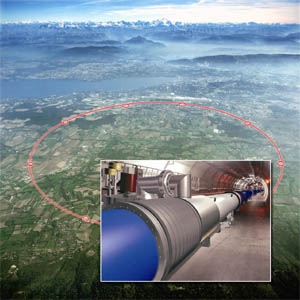
The Club of Amsterdam organises a visit to CERN in Geneva, Switzerland. It will be a 1-day trip in January or February 2011.
For more information, please send us an email
Club of Amsterdam blog
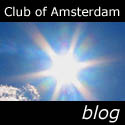
Club of Amsterdam blog
http://clubofamsterdam.blogspot.com
October 6: The Girl
October 6: Life
October 6: The Bird
October 6: Deep Diving
October 6: Shadows
October 6: Darkness
October 6: An Execution
June 16: Leadership
May 14: Sustainable Technologies for the Next Decade
May 10: What is the future of natural gas in Europe?
April 8: The Dawn of the Intelligent Planet
News about the Future

Urban Mining
“Urban mining processes have increased because of the desire to reuse any valuable commodities possible. Take a cell phone for example. Nearly all parts of the phone – plastics, glass, metals, battery and packaging – can be reused in some way.”
Urban Mining is a term which stands for the re-use of urban waste (including sewage) in order to extract useful materials.
“The industry is called “urban mining,” and in addition to recycling metal, glass and plastic, it could soon turn urban sewers into fertilizer mines.”

Ocean Power
BioPower Systems is commercialising ocean power conversion technologies. Through the application of biomimicry, we have adopted nature’s mechanisms for survival and energy conversion in the marine environment and have applied these in the development of our proprietary bioWAVE ocean wave energy system and bioSTREAM tidal energy system. These systems inherit benefits developed during 3.8 billion years of evolutionary optimization in nature’s ocean laboratory. Like their natural counterparts, the systems are designed to move and sway in tune with the forces of the ocean, and naturally streamline when extreme conditions prevail. This leads to lightweight engineering structures and lower costs.
The bioWAVE and bioSTREAM are designed to supply utility-scale grid-connected renewable energy using efficient modular systems. These automated systems will be mounted on the seabed and operate beneath the ocean surface, out of view, and in harmony with the marine inhabitants that inspired their design.
Recommended Book
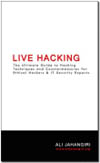
Live Hacking: The Ultimate Guide to Hacking Techniques & Countermeasures for Ethical Hackers & IT Security Experts
by Ali Jahangiri
Dr. Ali Jahangiri, a world-renowned information technology (IT) expert, brings us the next must-have in IT training: Live Hacking, the definitive and comprehensive guide to computer hacking. Groundbreaking, insightful, and practical, this guide serves to inform IT professionals about and challenge existing conceptions of hacking, its victims, and its consequences, but with an eye to empowering prospective victims with the knowledge they need to thwart the criminal elements in cyberspace. Whether you work in a Fortune 500 company or if you’re just looking to protect your home office from hackers, this book will provide you with all the information you need to protect your valuable information. Live Hacking is straightforward, easy to read, and a reference that you’ll use again and again. It’s the kind of book you’ll want to keep in your back pocket! With a user-friendly writing style and easy-to-follow diagrams and computer screenshots
Recycled Island
Recycled Island
by WHIM architecture
Recycled island is a research project on the potential of realizing a habitable floating island in the Pacific Ocean made from all the plastic waste that is momentarily floating around in the ocean.
The proposal has three main aims:
- Cleaning our oceans from a gigantic amount of plastic waste;
- Creating new land;
- And constructing a sustainable habitat. Recycled island seeks the possibilities to recycle the plastic waste on the spot and to recycle it into a floating entity. The constructive and marine technical aspects take part in the project of creating a sea worthy island.
The main characteristics of the island are summarized:
- Realized from the plastic waste in our Oceans. This will clean our Oceans intensely and it will change the character of the plastic waste from garbage to building material. The gathering of the plastic waste will become a lot more attractive.
- The island is habitable, where it will have its value as land capturing and is a potential habitat for a part of the rising amount of climate refugees.
- The habitable area is designed as an urban setting. Nowadays already half of the World population lives in urban conditions, which has a huge impact on nature. The realization of mixed-use environments is our hope for the future.
- The island is constructed as a green living environment, from the point of view of a natural habitat. The use of compost toilets in creating fertile ground is an example in this.
- It is a self sufficient habitat, which is not (or hardly) depending from other countries and finds its own resources to survive. The settlement has its own energy and food sources.
- The island is ecologic and not polluting or affecting the world negatively. Natural and non polluting sources are used to let the island exist in harmony with nature.
- The size of the floating city is considerable in relation to the huge amount of plastic waste in the Ocean. The largest concentration of plastic has a footprint the size of France and Spain together. Starting point is to create an island with the coverage of 10.000Km2. This is about the size of the island Hawaii.
- The location is the North Pacific Gyre, where at this moment the biggest concentration of plastic waste is discovered. This is geographically a beautiful spot North-East to Hawaii. By recycling and constructing directly on the spot with the biggest concentration of plastic waste, long transports are avoided. Because of the floating character the position could eventually be altered.
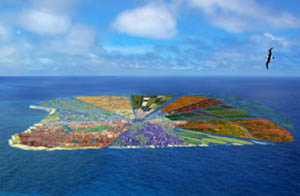
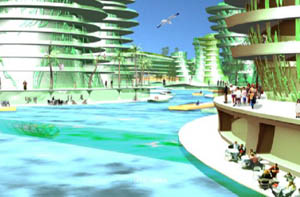
World Social Science Report, 2010
Social Sciences: 2010 World Report observes growth in emerging countries
The social sciences, which were dominated by western universities for a long time, are gaining ground in Asia and in Latin America, according to a report by the International Social Sciences Council (ISSC), published jointly with UNESCO. Entitled “Knowledge Divides”, it is a worldwide status report about these disciplines.
According to the study, North America and Europe still publish 75% of social science journals worldwide, with 85% of them partially or totally in English. A quarter of them are published in the United States. The disciplines that are the subject of greatest number of publications in the world are economics and psychology.
Two-thirds of social science journals in the world are published in the United States, the United Kingdom, the Netherlands and Germany. The UNESCO and ISSC report highlights contrasting developments in the different regions of the world. Social sciences are developing in countries such as China, India and Brazil.
Thus, in Brazil, the number of social science researchers has practically tripled in the last ten years. In China, the Social and Human Sciences budget has increased by 15 to 20% a year since 2003. Despite this imbalance, the authors observe that the strongest growth in the number of articles published is in Latin America and Europe.
On the other hand, the Russian Federation and Commonwealth of Independent States have seen a sharp drop since the disappearance of the Soviet Union, due to the falling number of researchers and their ageing, while Russian universities struggle to attract new talent. In Sub-Saharan Africa, three quarters of publications in the field of social sciences are from a few universities that are mainly located in three countries; South Africa, Kenya and Nigeria.
This situation can be partly explained by the brain drain, even if Africa is far from being the only region concerned. The authors thus note that one doctor of economics in three working in the United States and nearly one doctor of social sciences in five was born abroad. “As this report illustrates, social scientific knowledge is often least developed in those parts of the world where it is most keenly needed,” said UNESCO Director-General Irina Bokova, in her foreword to the text. “Social scientific endeavour is also poorer for its bias towards English and English-speaking, developed countries. This is a missed opportunity to explore perspectives and paradigms that are embedded in other cultural and linguistic traditions.”
The authors observe that the world needs the social sciences more than ever, in order to confront the major challenges facing humanity, such as poverty, epidemics and climate change. Social sciences do not respond to these challenges as much as they should, mainly due to disparities in the research capacities of different countries. Several hundred social science specialists from all over the world have contributed their expertise to this report. Gudmund Hernes, President of the ISSC, François Héran, Director of Research of the French National Institute for Demographic Studies (INED), Adebayo Olukoshi, Director of the United Nations African Institute for Economic Development and Planning (UNIDEP), and Hebe Vessuri, Director of the Venezuelan Institute for Scientific Research (IVIC) are among the experts who presented the Report during its launch at UNESCO’s Paris headquarters today. “The social sciences have become truly global: they are taught almost everywhere. Their research results are widely disseminated,” stated Gudmund Hernes, President of the ISSC.
However, he noted that they have been often criticized for their inability to foresee major events such as the fall of the Berlin Wall in 1989 or the 2007 financial crisis. But for him, “to face actual and future challenges and effectively address global and local problems, more and better social science is vital – i.e. understanding how the world works from the ways humans interact.” Looking beyond the progress and deficiencies noted in the report, Irina Bokova stated that “the report reaffirms UNESCO’s commitment to the social sciences, and our desire to set a new global agenda to promote them as an invaluable tool for the advancement of the internationally agreed development goals.”
World Social Science Report 2010
summary
full report
Futurist Portrait:

| Patricia Aburdene is one of the world’s leading social forecasters. For twenty-five years, she has been tracking how change impacts business. Through her books, talks and workshops, Patricia has helped thousands of organizations and millions of people make the most of social change and transformation. Co-author of the number one, New York Times bestseller Megatrends 2000, Patricia newest book is, Megatrends 2010: The Rise of Conscious Capitalism, a blueprint of the social, economic and spiritual trends transforming free enterprise. As the tag line promises, the book describes seven new trends that will transform how you “Live, Work and Invest.” Patricia was John Naisbitt’s collaborator on the publishing phenomenon Megatrends which topped charts in the U.S., Germany and Japan. She co-wrote the best-selling Re-inventing the Corporation and Megatrends for Women.Patricia has lectured throughout the U.S., Canada, Europe, South America, Australia and the Pacific Rim. Clients include Adecco, the Professional Coach and Mentor Association, the Management Institute of New Zealand and the Consciousness in Business conference in Santa Fe, New Mexico (Click “Speaking” for an expanded list of clients).Patricia’s lifelong career in business journalism began at Forbes in 1978. As a Public Policy Fellow at Radcliffe College, Cambridge, Massachusetts, from 1993 to 1996, she explored emerging leadership models.Patricia Aburdene holds a BA in philosophy from Newton College of the Sacred Heart (now Boston College), an MS in library science from Catholic University and three honorary doctorates. In 1990, she was awarded the Medal of Italy for her interpretation of global trends. Patricia serves as an Advisor to Dallas-based Satori Capital, a social equity investor that specializes in Conscious Capitalist companies. Patricia lives in Boulder, Colorado and Manchester-by-the-Sea, Massachusetts. Having won global recognition as co-author of the Megatrends books, Patricia now inspires audiences with a concrete blueprint of how values and consciousness will transform business. Her most recent book is Megatrends 2010: the Rise of Conscious Capitalism. |
Agenda
| Season Program 2010/2011 | ||
| October 14, 2010 18:30-21:15 November 25, 2010 18:30-21:15 | | the future of Hacking Location: Hogeschool van Amsterdam, Auditorium, Singelgrachtgebouw, Rhijnspoorplein 1, 1091 GC Amsterdam the future of Happiness Location: Hogeschool van Amsterdam, Auditorium, Singelgrachtgebouw, Rhijnspoorplein 1, 1091 GC Amsterdam |
| January 20, 2011 18:30-21:15 | the future of Financial Infrastructure | |
| February 17, 2011 18:30-21:15 | the future of Services | |
| March 17, 2011 18:30-21:15 | the future of Shell | |
| April 14, 2011 18:30-21:15 | the future of the Human Mind | |
| May 19, 2011 18:30-21:15 | the future of the Singularity | |
| June 23, 2011 18:30-21:15 | the future of European Democracy | |
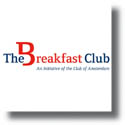 |







Customer Reviews
Thanks for submitting your comment!